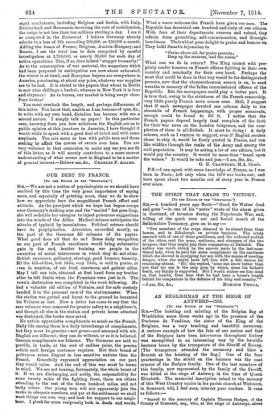OUR DEBT TO FRANCE.
[To TEN EDITOR 07 THY "SPIICTATOR."
SIR,—We are not a nation of psychologists or we should have realized by this time the very great importance of saying more, and especially of printing more, than we do to show how we appreciate here the magnificent French effort and attitude. As the paralysis which we hope has begun creeps over Germany's striking arm and the "mailed" fiat goes limp, she will redouble her energies to inject poisonous suggestions into the minds of the Allies. Medical science anticipates the attacks of typhoid by inoculations. Political science should have its prophylactics. Atrocities, unverified mostly, on the part of the Germans fill columns of the papers. What good does all that do us ? Some daily recognition on our part of French excellence would bring substantial gain in the end, besides training our people in the smenities of social intercourse in which they do not shine. British successes, gallantry, strategy, good humour, tenacity, fill the bill-of-fare, but little, very little, is said in praise, or (yen in mention, of our kind, courteous, and gallant allies. May I tell one tale, obtained at first hand from my brother after he left Senlis when the Prussians were just in it. The town's destruction was completed in the week following. He had a valuable old edition of Voltaire, and for safe custody handed it to the personal care of the stationmaster. When the station was gutted and burnt to the ground he lamented his Voltaire as lost. Now a letter has come to say that the rare volumes were removed for greater safety to a neighbour's, and though all else in the station and private house attached was destroyed, the books were saved.
No nation appreciates compliments so much as the French. Daily life among them is a daily interchange of compliments, but they must be genuine—not gross—and seasoned with wit.
English are different; they can do without, or so it is believed. German compliments are fulsome. The Germans are said to provide, in trade, at the cost of endless pains, the precise article each foreign customer requires. But their brand of politeness raises disgust in less sensitive nations than the French. Gracefully expressed appreciation on our part they would value. And the end of this war must be borne in mind. We are not bearing, fortunately, the whole brunt of it. If we are discharging, and nobly, the responsibility for some twenty miles of the fighting front, there are others attending to the rest of the three hundred miles, and not badly either. Our young men will not apparently join the ranks in adequate numbers, and yet at the settlement we shall want things our own way, and look for support to our neigh- bour. I plead for some reciprocity both in deeds and words.
What a warm welcome the French have given our men. The Republic has decorated one hundred and sixty of our officers. With four of their departments overrun and ruined, they refrain from grumbling, self-commiseration, and ill-neigh. bourliness. Their ablest pens delight to praise and honour us. They fulfil Smart's injunction to "Praise above all, for praise prevails; Heap up the measure, load the scales."
What can we do in return? The King cannot with pro. priety confer honours on French officers fighting in their own country and nominally for their own hand. Perhaps the most that could be done in that way would be for distinguished
persons, now that the chrysanthemum season is on, to send wreaths in memory of the fallen commissioned officers of the Republic. But the newspapers could play a better part. It is true that, owing to the strictness of the French censorship, very little purely French news comes over. Still, I suggest that if each newspaper devoted one column daily to the chronicle of French happenings, with proper comments, enough could be found to fill it. I notice that the French papers depend largely (and complain of the fact) for their war news on the London telegrams, and the com- plexion of them is all-British. It must be tiring! A daily column, such as I venture to suggest, even if English readers chose to skip it, would be freely quoted in France, and run like wildfire through the ranks of the Army and among the civil population. It may be asking a lot of our editors, but it would pay the country. It would be more than "bread upon the waters." It would be cake and jam.—I am, Sir, &c.,
G. E. CRAWFORD, M.A. Carob.
P.S.—I can speak with some knowledge of France, as I was born in Paris ; left only when the 1870 war broke out; and have spent about two months out of every year in France ever since.














































 Previous page
Previous page